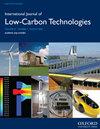Study on the influence of digital financial inclusion on agricultural carbon emission efficiency in the Yangtze River Economic Belt
IF 2.3
4区 工程技术
Q3 ENERGY & FUELS
引用次数: 0
Abstract
Abstract Improving the efficiency of agricultural carbon emission is an inevitable choice for high-quality sustainable development. As a new financial intermediary, what impact does the growth of digital financial inclusion have on the efficiency of agricultural carbon emissions? This paper uses the SBM-ML model to calculate the agricultural carbon emission efficiency of 110 prefecture-level cities in the Yangtze River Economic Belt from 2012 to 2020. Then, it analyzes its temporal and spatial evolution trend. Based on it, the panel regression model is used to analyze how the growth of digital financial inclusion affects agricultural carbon emission efficiency. Results show the following: (1) from the time dimension, the efficiency generally declined first and then rose with less fluctuations and stability, which is determined by technical efficiency and technological progress change, and from the spatial dimension, the number of cities with agricultural carbon emission efficiency greater than 1.0 is generally increasing, reflecting that the overall level is increasing; and (2) the growth of digital financial inclusion has a negative impact on agricultural carbon emission efficiency. The improvement of agricultural carbon emission efficiency has been hampered by the use depth and digitalization level of digital financial inclusion, but its coverage breadth can support this improvement. This paper aims to advance digital financial inclusive growth and low-carbon transformation of agriculture in China.数字普惠金融对长江经济带农业碳排放效率的影响研究
摘要提高农业碳排放效率是实现高质量可持续发展的必然选择。作为一种新型金融中介,数字普惠金融的发展对农业碳排放效率有何影响?本文采用SBM-ML模型对2012 - 2020年长江经济带110个地级市的农业碳排放效率进行了计算。然后,分析了其时空演变趋势。在此基础上,运用面板回归模型分析数字普惠金融增长对农业碳排放效率的影响。结果表明:(1)从时间维度上看,农业碳排放效率总体呈现先下降后上升的趋势,且波动较小,具有稳定性,这是由技术效率和技术进步变化决定的;从空间维度上看,农业碳排放效率大于1.0的城市数量总体呈增加趋势,反映出整体水平在提高;(2)数字普惠金融的增长对农业碳排放效率有负向影响。农业碳排放效率的提升受到数字普惠金融使用深度和数字化水平的制约,但其覆盖广度能够支撑农业碳排放效率的提升。本文旨在推动中国数字金融普惠增长和农业低碳转型。
本文章由计算机程序翻译,如有差异,请以英文原文为准。
求助全文
约1分钟内获得全文
求助全文
来源期刊

International Journal of Low-carbon Technologies
Engineering-Architecture
CiteScore
4.30
自引率
4.30%
发文量
106
审稿时长
27 weeks
期刊介绍:
The International Journal of Low-Carbon Technologies is a quarterly publication concerned with the challenge of climate change and its effects on the built environment and sustainability. The Journal publishes original, quality research papers on issues of climate change, sustainable development and the built environment related to architecture, building services engineering, civil engineering, building engineering, urban design and other disciplines. It features in-depth articles, technical notes, review papers, book reviews and special issues devoted to international conferences. The journal encourages submissions related to interdisciplinary research in the built environment. The journal is available in paper and electronic formats. All articles are peer-reviewed by leading experts in the field.
 求助内容:
求助内容: 应助结果提醒方式:
应助结果提醒方式:


